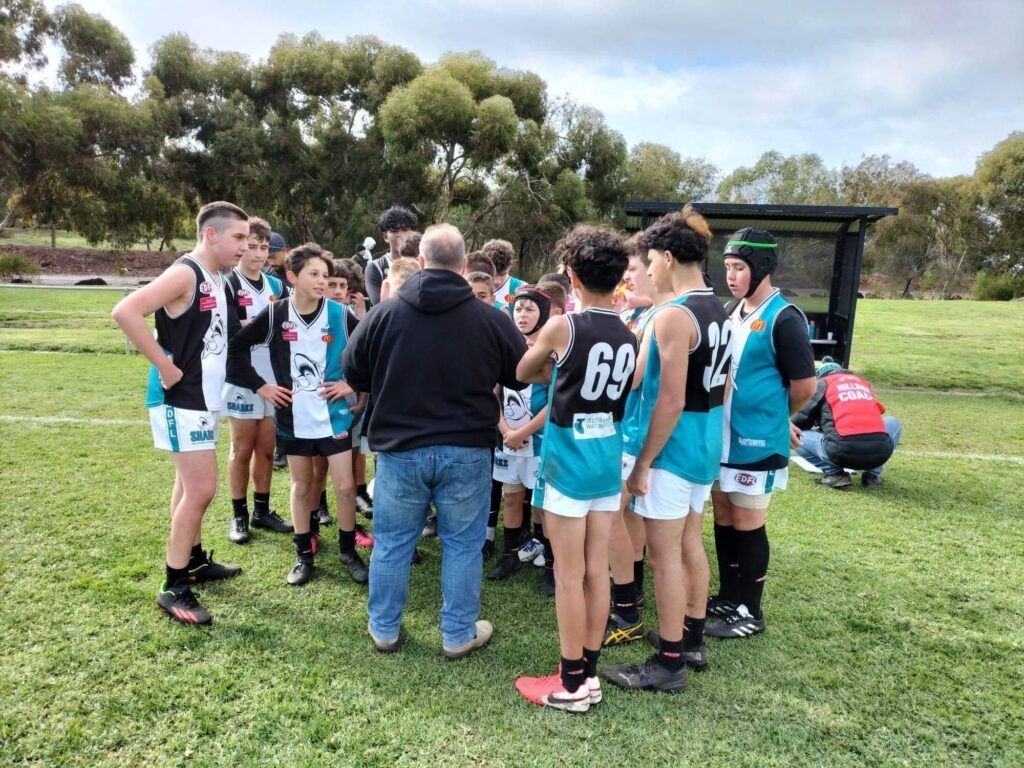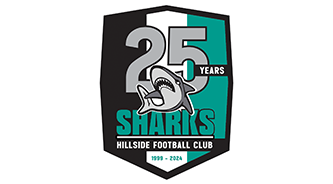AFL SAFE FOOTY GUIDELINES | BE SAFE • FEEL SAFE • PLAY SAFE
Rules and Policies
The Hillside Football Club (Coach and Volunteers)
Coach and Volunteers Information is incorrect
EXPECTED BEHAVIOURS OF COACHES & VOLUNTEERS
WHAT ARE THE EXPECTED
BEHAVIOURS OF ADULTS
IN FOOTBALL?
Coaches and volunteers across AFL programs and community
clubs are required to follow safeguarding policies, procedures
and codes and should make themselves familiar with those
relevant to their roles.
Any behaviour from a coach or volunteer that is
considered unsafe (and in some cases, illegal) will
be addressed by the AFL, a club, league, association
or even the police.
This information sheet is not just here to provide you with a
guide of how you should behave, but it is also informs you of
how other adults should behave, so if you notice something
that doesn’t seem right, you should call it out.
DEFINITIONS
A Child: someone involved in footy who
is 12 years or younger – usually a player
but may also be a sibling of a player or
child of an adult at the club.
A Young Person: someone involved
in footy who is between the ages of 13
and 18 years old – usually a player but
could also be an umpire or in another
role at the club, or a sibling or child of
a player.
Adult: someone involved in footy who
is over the age of 18 – this could be a
coach, manager, umpire, club official,
AFL staff member, volunteer, and/or
a parent.

ALL ADULTS ARE EXPECTED TO ENSURE
CHILDREN AND YOUNG PEOPLE ALWAYS FEEL SAFE
AND WELCOME IN AUSTRALIAN FOOTBALL
OK
Contact
Physical touch that is normal for football and happens
in front of other people and WITH the child or young
person’s consent.
This can include tackling, demonstrating skills and
techniques, preventing injury, or keeping them safe, or
high fives or a pat on the back to celebrate a win.
Communication
Guidance that is positive, helpful, and
focused on the child or young person’s football skills and game, not them as a person.
Language that is calm and kind and that they can easily understand.
Online communication that includes a parent or career
and is used with the whole team.
Boundaries
When someone has safe, or good boundaries it means they:
have made sure children and young people understand their role
- Act professionally – friendly but not a friend
- Treat everyone in the team fairly
- Follow the rules with things like sharing information about a child or young person, or only taking photos of them with their permission and their parents or carer’s permission, and when it is about football
- Always behave appropriately when around the children and young people that they are responsible for.
Supervision
Coaches who are responsible for
supervising children and young people in football should:
- Always know where the children or young people are at all times
- Give them privacy to use the bathroom or change rooms, but still make sure that they are safe
- Wait with them until they have been collected only offer a lift if they have their licence and their car is insured, a parent or carer has provided written consent and another person from the club knows about it.
NOT OK
Contact
Any touch a child or young person does not consent to, or that makes them feel uncomfortable.
Any touch that seems sexual, involves a child or young person’s private parts, or embarrasses them.
Any touch that happens in a private place like the changerooms or a car.
Communication
Any language or communication that leaves a child or young person feeling
uncomfortable, worried, scared or
embarrassed.
Any comment online or in person that is sexual or private.
Any contact that happens outside of
training and match day hours (like late at night), or on private chat platforms
(like socials or texting), is over the top or excessive, or is about personal stuff,
nothing to do with football.
Boundaries
When someone has unsafe, or poor
boundaries, it means they:
- Favour, isolate or single out one person
- Accept or give gifts to children, young people or their families (unless fairly distributed and prior consent has been obtained)
- Contact a child or young person and/or their families (or former players) outside of football activities, including through social media unless an established relationship already exists (family or friends) and no boundaries are crossed as part of that contact
- Offer to assist a child or young person or their family with things that are outside of their role (help around the house / money / buying them things)
- Drink alcohol, take drugs, swear or smoke in front of young people at football.
Supervision
Coaches who are responsible for
supervising children and young people in football should not:
- Be distracted by their phones or other people
- Let young children use a bathroom without making sure there are no risks first
- Leave a child or young person alone, even if they are late to be picked up
- Dive children or young people around in their car recklessly, under the influence of alcohol or drugs, or without permission.
OK
Environment
A safe environment for children and young people at football looks like:
- A space that people from different backgrounds and abilities can access and are comfortable to access
- Football trips that are fun and safe for children and young people to attend
- Camps where children and young people are given privacy, made to feel welcome and are able to communicate with home when they need to
- Change facilities in grounds that are appropriate for any gender
- Online spaces where communication is open and transparent and other adults can monitor.
NOT OK
Environment
An unsafe environment for children and young people at football looks like:
- A space that is difficult for children and young people with disabilities to access or where people from different cultural backgrounds feel left out
- Footy trips or events that involve alcohol or drugs and easily get out of hand with no adults keeping an eye out for children and young people
- Camps where children and young people are punished, humiliated or made to feel homesick and uncomfortable
- Change facilities in grounds where there is no privacy and children, young people and those who identify as transgender or non-binary feel unsafe
- Online spaces where communication is one to one and used to share inappropriate material not related to football.
WHAT TO DO NEXT

SAY SOMETHING
Even if you have not spoken directly with a child or young person but you have a

SUSPICION
that something is not right, it is important you say something.

You can:
Speak directly with someone you trust in football like a coach, team manager, umpire, official or club representative.

Get In Touch
Write down your concerns and pass them onto your club or association via email or a letter.

Scan Now
Use this QR code to raise a concern with the AFL.
